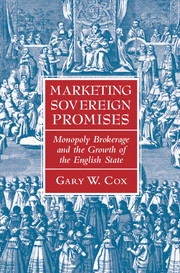Book contents
- Frontmatter
- Contents
- List of Tables and Figures
- Preface
- 1 Sovereign Credibility and Public Revenue
- PART I THE GLORIOUS REVOLUTION AND THE ENGLISH STATE
- PART II THE ENGLISH CONSTITUTIONAL DIASPORA
- 10 Exporting the Revolution – The Early Adopters
- 11 Exporting the Revolution – The Late Adopters
- 12 Good Political Institutions
- References
- Index
- Miscellaneous Endmatter
11 - Exporting the Revolution – The Late Adopters
from PART II - THE ENGLISH CONSTITUTIONAL DIASPORA
Published online by Cambridge University Press: 05 May 2016
- Frontmatter
- Contents
- List of Tables and Figures
- Preface
- 1 Sovereign Credibility and Public Revenue
- PART I THE GLORIOUS REVOLUTION AND THE ENGLISH STATE
- PART II THE ENGLISH CONSTITUTIONAL DIASPORA
- 10 Exporting the Revolution – The Early Adopters
- 11 Exporting the Revolution – The Late Adopters
- 12 Good Political Institutions
- References
- Index
- Miscellaneous Endmatter
Summary
After the first wave of English parliamentarism had washed over nineteenth-century Europe, subsequent waves – mediated mostly by colonization – swept the globe. The vast bulk of these late adopters’ constitutions mandated an annual statutory budget. Yet, the resulting budgets have often been little more than executive promises. In other words, the first step England took to limit the executive has not been taken by many of its inheritors and imitators worldwide.
To avoid the trammels of legislative bargaining, executives have pursued the same three strategies Stuart monarchs used – but with more success. First, some rulers have reached power by militarily crushing their political oppositions. Such rulers, when they issue annual budgets, do not subject them to meaningful legislative approval. Second, some rulers have established one-party states in which the legislature is no longer independent. Legislative approval in these cases is a foregone conclusion. Third, some rulers have defanged their legislatures, reducing their de jure control over state expenditures.
Because violence and one-partyism are both well-recognized routes to autocracy, I focus here on the last and least obvious tactic of executive control: removing the legislature's de jure fiscal rights. Although some constitutions, such as Saudi Arabia's, confer no power on the legislature at all, most confer an incomplete set of rights, leaving gaps the executive can exploit. In particular, many constitutions have created executive decree powers at least as strong as those conferred by Denmark's Revised Constitution of 1866, while others have mandated budgetary reversions no less favorable to the executive than Spain's Constitution of 1876. Even when these provisions have not been actively exploited, their mere existence has undermined the legislature's bargaining position vis-à-vis the executive and, accordingly, lessened the extent to which national budgets are parliamentary promises.
To elaborate these points, I proceed as follows. Sections 11.1 and 11.2 discuss what I call executive-favoring budgetary reversions (or EFRs). Section 11.3 shows that the world's constitutions, over the period 1875–2005, have increasingly opted for EFRs. Sections 11.4– 11.6 examine some consequences of EFRs. In particular, I explore how they affect tax revenues in a cross-section of sixty-seven democracies; and the duration of democracies over the period 1875–2005.
- Type
- Chapter
- Information
- Marketing Sovereign PromisesMonopoly Brokerage and the Growth of the English State, pp. 153 - 176Publisher: Cambridge University PressPrint publication year: 2016

